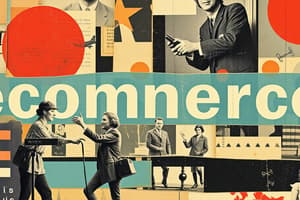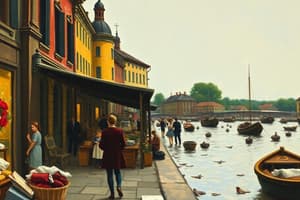Podcast
Questions and Answers
What is commerce?
What is commerce?
The effective process of exchanging products or services using some monetary aspects as well as the logistical process.
Which of the following are part of commercial choices? (Select all that apply)
Which of the following are part of commercial choices? (Select all that apply)
- Where to vacation
- What career to follow (correct)
- How much money to save (correct)
- What to buy (correct)
What is a consumer?
What is a consumer?
A consumer is someone who purchases goods and services to satisfy their needs and wants.
What does 'scarcity' mean?
What does 'scarcity' mean?
Define opportunity cost.
Define opportunity cost.
What is impulse buying?
What is impulse buying?
What is the purpose of a budget?
What is the purpose of a budget?
What does 'Caveat Emptor' translate to?
What does 'Caveat Emptor' translate to?
What is a garnishee order?
What is a garnishee order?
What is a bankruptcy order?
What is a bankruptcy order?
Which of the following is NOT a type of resource used in production?
Which of the following is NOT a type of resource used in production?
Flashcards are hidden until you start studying
Study Notes
Overview of Commerce
- Commerce is the structured process of exchanging products or services, incorporating monetary aspects and logistics.
- It involves the exchange of goods and services among multiple parties, emphasizing large-scale buying and selling.
- The field of commerce investigates income generation, spending habits, production methods, and the influence of regulations on commercial behaviors.
Commercial Choices
- Individuals routinely make commercial decisions that encompass:
- What products to purchase
- What items to produce
- Living location choices
- Career path selections
- Investment decisions
- Savings strategies
Key Terms
- Consumer: An individual who purchases goods and services to meet their needs and desires.
- E-commerce: Buying and selling goods or services over the Internet by businesses and consumers.
- Trade: The act of selling and exchanging goods between parties.
- Industry: Economic activities focused on the production of goods and services.
- Consumer Needs vs. Wants:
- Needs are essential for survival (e.g., food, shelter).
- Wants are non-essential desires (e.g., luxury items).
Goods vs. Services
- Goods: Tangible products that can be physically handled.
- Services: Intangible activities performed for a fee.
Economic Concepts
- Resources: Inputs used in the production of goods and services.
- Scarcity: Limited availability of a product, leading to insufficient supply to satisfy demand.
- Choice: Making decisions when presented with alternatives.
- Opportunity Cost: The value of the next best alternative foregone when a choice is made.
- Income: Regular earnings received from various sources, including employment and investments.
Impulse Buying
- Describes spontaneous purchases made without thorough consideration.
- Impulse buying can lead to financial waste and unsatisfactory transactions.
- Factors to evaluate before a purchase include desire, affordability, and available alternatives.
Budgeting
- Establishing a financial plan is vital for maximizing satisfaction from income, requiring tracking of income and expenses.
Comparison Shopping
- Engaging in research to find the best deals enhances negotiating leverage.
- Key steps in effective comparison shopping include:
- Clarifying desires and requirements.
- Investigating product features and prices.
- Deciding on payment methods in advance.
- Checking refund and return policies.
- Understanding documents before signing.
- Comparing warranties and after-sales services.
- Retaining purchase records.
Consumer Protection
- Caveat Emptor: Latin phrase meaning "let the buyer beware," highlighting buyer responsibility to understand purchase risks.
- Garnishee Order: A legal directive allowing creditors to collect debts from a debtor’s income or properties.
- Writ of Execution: Court order enabling seizure of debtor's assets for debt recovery.
- Bankruptcy: Legal process providing relief for individuals unable to repay debts, potentially involving asset liquidation to settle obligations.
Bankruptcy Procedure
- Begins with a court order declaring the individual bankrupt.
- Involves selling off assets to satisfy creditor claims.
- Exempts further debts post-liquidation and provides creditor protection.
Types of Resources
- Resources utilized for meeting needs and wants are categorized into:
- Land: Natural resources like minerals, forests, and agricultural land.
- Labour: Human effort in production processes, including physical and intellectual contributions.
Studying That Suits You
Use AI to generate personalized quizzes and flashcards to suit your learning preferences.




